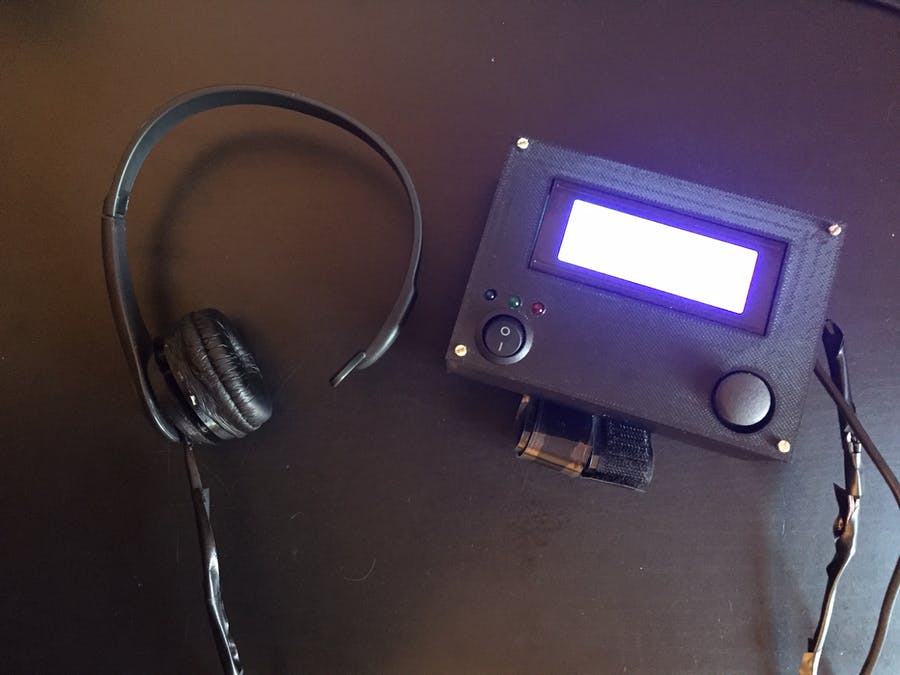Purdue Verti-Fix team wins grand prize in China-US maker competition
Verti-Fix is a wearable device that can be used to treat benign paroxysmal positional vertigo (BPPV), a condition affecting 8 million Americans that causes symptoms of dizziness, loss of balance, nausea, and a perception of spinning. Currently, patients in the US may need to travel for several hours to reach a vestibular specialist who can conduct the Epley Maneuver, the standard treatment to relieve patients' symptoms. The Verti-Fix device would enable emergency providers and general physicians to conduct the Epley maneuver, reducing patient travel time and improving accessibility to treatment. The long-term goal is to allow patients to perform the Epley maneuver at home as required.
The device houses accelerometers to quantify the angle of the patient’s head as it is tilted for the Epley Maneuver. The device is also equipped with LEDs to warn users as they get close to exceeding the recommended angles. It features an interactive screen which enables the user to select the appropriate type of Epley Maneuver to be used.
The Purdue Verti-Fix team comprises students who are members of Purdue MIND (Medical Innovation, Networking, and Design), a multi-disciplinary undergraduate student organization that promotes the growth of the biomedical engineering community at Purdue. The club fosters an environment where students can engage in medical innovation through solving modern clinical problems via their ingenuity, problem-solving skills and entrepreneurial mindsets. Members have the opportunity to participate in community service events, compete in design competitions, discuss current research, and network with a wide range of field professionals both within and outside of Purdue University.

The credit for the design and manufacture of the Verti-Fix device goes to all of the active members of Purdue MIND in 2018-19, including executive committee members: Srinivas Govindan, President (Weldon School of Biomedical Engineering); Andrew Beutler, Vice-President (School of Electrical and Computer Engineering); Damen Wilson, Director of Research & Development (Weldon School of Biomedical Engineering); Pragna Upputuri, Director of Entrepreneurship and Innovation (Weldon School of Biomedical Engineering); Ali Abu-Saleh, Treasurer (Weldon School of Biomedical Engineering); Jack Stickney, Secretary (School of Mechanical Engineering); and Emilie Favela, Director of Networking (Industrial Engineering Technology).
Although the students pursued the project for fun, they went through the standard process that any professional would engage in to identify a real clinical need.
“The club went through an ideation process during the fall 2018 semester to talk to patients and other professionals to identify a clinical need,” said Srinivas Govindan, a rising senior at the Weldon School of Biomedical Engineering and the Purdue MIND president during the year the Verti-Fix was designed and developed. “We interviewed people and made a shortlist of practical ideas which we as a college club can address. This device was chosen after we voted as a club to pursue it because the technology we needed to work with was within our financial and educational reach.”
Govindan added that a primary reason they chose this project was the opportunity to work with their clinical mentor, Tatyana Beyzerov, a vestibular specialist at the Richard L. Roudebush Veterans Affairs Medical Center in Indianapolis. “She worked with us in the design of the device and walked us through what the current clinical need is with patient treatment.”
The Co-making the Future China-US Young Maker Competition is an activity that supports the People-to-People Exchange between China and the US. The Competition enables makers to create innovative products in several categories, including health and fitness, by combining innovative design and cutting-edge technologies.
Team members Damen Wilson (team leader), Pragna Upputuri, Jack Stickney, Andrew Beutler, and Ali Abu-Saleh have been selected to represent the team in China. This is the second time Purdue MIND was represented in the competition. In 2017, the Purdue ExoMIND Glove team won 3rd place in the competition, a record the Purdue Verti-Fix team hopes to beat this year.
Purdue MIND is advised by Hugh Lee, an assistant professor, and Orlando Hoilett, a graduate student, both in the Weldon School of Biomedical Engineering.
